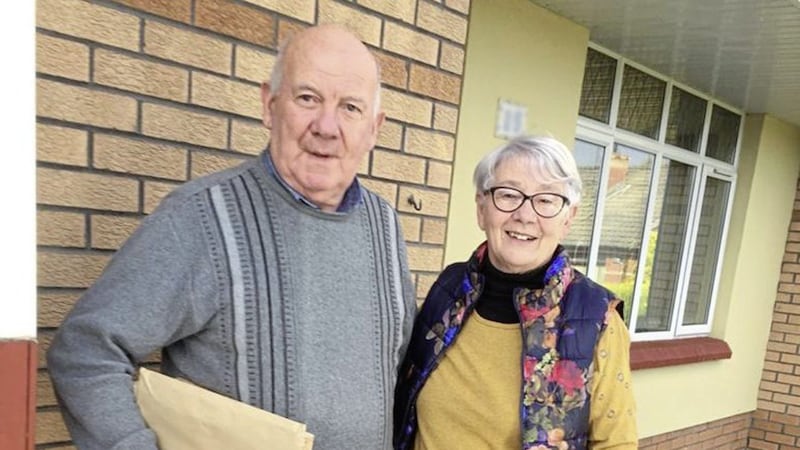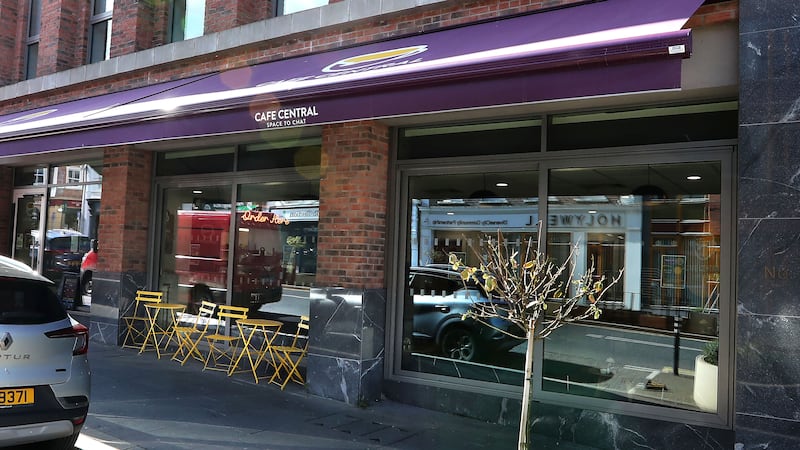WHEN Claudy pensioner Seamus O'Kane was diagnosed with dementia five years ago, his wife Lyn remembers posing the question to the doctor: "Where do we go from here?"
With no treatment plan available and little knowledge of where to turn to for support, the mum-of-five recalls feeling unsure about the future and completely cut off.
Living in a rural community exacerbated that sense of isolation so Lyn was relieved to come across Deeds (Dementia Engaged and Empowered in Derry & Strabane). The project is run by The Old Library Trust Healthy Living Centre in Creggan in Derry, which has received over £1 million from The National Lottery Community Fund since 2009.
The aim of the three-year Deeds project (2018-2021) is to provide support for those living with mild and moderate dementia in the Derry/Strabane areas; reducing isolation, increasing confidence and improving their mental health. The project also looks out for carers and helps them understand dementia, while offering self-care tips as well.
For Lyn, who is 77, and her 78-year-old husband, Deeds was much more than a social hub, a shoulder to cry on or a listening ear. It was a "lifeline"; providing routine, activities, camaraderie and connections. When lockdown restrictions were introduced last March and the groups which Lyn and Seamus regularly attended shut down, she was concerned they would feel cut adrift once again.
But Lyn need not have worried. With dozens of people living with dementia and their carers to look out for, Deeds quickly adapted to the new normal of Covid times. Staff moved services online, delivered tablet devices to all their members to encourage connectivity, created activity packages and checked in by telephone to make sure everyone was coping.
“Seamus's dementia has been gradually getting worse and lockdown hasn't helped,” says Lyn. “We do miss social things, like going to the dance every Friday night or to our local pub on a Saturday.
“For someone with dementia, social interaction is important, even if Seamus can't hold a full conversation [or] forgets a word or a face. Seamus loves seeing people and he likes routine too. He likes doing activities. It's important for people with dementia to keep their brains active. It's like that old saying goes, 'If you don't use it, you lose it'.
“There's nothing worse for them than sitting in the house, doing nothing, so I think lockdown has been quite tough. Seamus loves attending the Deeds hub at Park, just outside Claudy. It's something he really looks forward to.
“When everything stopped, I was worried that we would feel cut off. It was horrendous to begin with. There was nothing to enjoy or to do. After a while we were able to go out for walks and out into the garden, which was great.
“But then Deeds stepped in, giving us a tablet device to keep connected. We were able to do exercises and activities then. We did things like arts and crafts and took part in a storytelling group.
“I learned how to do Zoom, which was a new experience for me. I have to say, they really worked hard to keep us all connected and to make sure we didn't feel isolated. They rang us regularly too, to make sure we were both doing OK.”
Seamus was diagnosed with PPA (primary progressive aphasia) in 2016 after his wife and five children began to notice he was forgetting words and struggling with crosswords. At the time, Lyn knew little about dementia but was warned Seamus's condition would deteriorate. For his part, he was philosophical about it and put it down to the ageing process.
As his dementia gradually worsened, Lyn found out about Deeds and went along to the hub at Park, to see what support the charity could provide. The couple attended weekly, buoyed by the friendships made there and the sense of togetherness.
“It was great to be with other people who were in the same boat,” Lyn explains. “Dementia can be isolating. In many ways it's like the way cancer used to be. People were almost afraid to mention it or didn't know what to say.
“We met other couples there, people living with dementia and carers. It was nice to be able to talk to them, have a cup of tea, take part in activities like sing-songs or crafts.
“Dementia wasn't mentioned. There was no judgment or anything like that.”
Lyn also joined a group for carers which was held at the Old Library Trust in Derry. While Seamus took part in the various activities, she enjoyed some much-deserved me-time. The carers' group has been invaluable, she says.
“I tend not to think too far ahead, but to just take one day at a time,” says Lyn. “Seamus can still get out of bed and dress himself, so I count myself lucky. We can still go out for walks and hopefully soon, we can get back to our groups. Deeds really has been such a lifeline for us.”
Deeds began life as an educational programme aimed at the community, to help people understand dementia and to raise awareness about how to treat people living with dementia properly. Based in Creggan, it also has five satellite hubs, including the one at Park. In 2018 the project received a £474,504 National Lottery grant for three years, to support people with dementia and those who care for them. Every week, across the UK, National Lottery players raise £30 million for good causes like this.
As part of the programme, those who attend the weekly sessions enjoy a range of activities from music to movement, with a separate focus on carers. Nature walks and cinema days also give people a chance to connect. In addition, the project provides training sessions for carers and first year nurses at Magee University, while school children are also taught about dementia in health and social care classes.
Sinead Devine, co-ordinator, Deeds and Older People, says lockdown forced staff and volunteers to get creative and come up with novel ways of engaging members and ensuring no one felt left behind.
“We created online content on Facebook and YouTube; arts, singing, poetry, life stories. People were able to join in,” she says.
“We also kept in touch with our carers, providing a listening ear and helping them explain to their partners all about Covid. We sent pamper packs out to the carers and volunteers.
“The funding we've received for Deeds has made such a difference to so many lives and we're so grateful. Thank you to National Lottery players for making the money possible.
“One woman who took part in our bespoke one-to-to-one programme for carers, said it had helped her so much that now she's back to enjoying a father/daughter relationship. She no longer just feels like his carer.
“To hear that kind of feedback has been amazing.”




